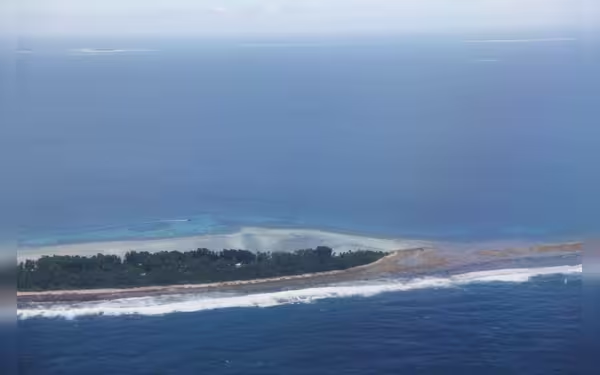Saturday, November 16, 2024 09:40 PM
Youth in Tuvalu Face Climate Dilemma Over Future
- Tuvalu youth confront climate change challenges.
- Grace Malie highlights emotional struggle of relocation.
- Sovereignty and identity at risk due to rising sea levels.
 Image Credits: thefrontierpost
Image Credits: thefrontierpostTuvalu's youth, like Grace Malie, face tough choices amid climate change, balancing identity and future amid rising sea levels.
The issue of climate change is not just a distant concern; it is a pressing reality for many young people around the world, particularly those living in vulnerable regions like Tuvalu. This tiny island nation is facing the harsh consequences of rising sea levels, which threaten to erase its land and culture. For young individuals like Grace Malie, the question of whether to stay or leave their homeland is not just a matter of personal choice but a profound dilemma that weighs heavily on their future.
Grace Malie, a 25-year-old representative of Tuvalu, recently spoke at a special U.N. General Assembly summit focused on sea level rise. She shared her internal struggle about whether to remain on her beloved island or to relocate to Australia, a decision that her government has termed "Plan B." This choice is not merely about geography; it encompasses her identity, heritage, and the future of her potential children. "I want them to have a safe and quality life," she expressed, highlighting the emotional turmoil that accompanies such a decision.
Malie's situation is not unique. Many young people in Tuvalu and similar nations are grappling with the reality of climate change and its impact on their lives. The conversation about leaving home is fraught with emotion, as families discuss the implications of relocation. Tuvalu's Climate Minister, Maina Talia, also faces this challenge as he considers the future of his children. He fears that leaving Tuvalu could compromise their identity, a sentiment echoed by many parents in similar situations.
The summit highlighted the critical issues of sovereignty and identity for nations like Tuvalu. As sea levels rise, the very existence of these nations is threatened, leading to discussions about what it means to be a sovereign state when the land itself may no longer be there. "Sovereignty is defined by the will of the people, not by the whims of climate change," stated Belize Prime Minister John Briceño, emphasizing the importance of maintaining cultural identity even in the face of environmental challenges.
For young people like Grace Malie, the decision to stay or go is not just about physical safety; it is about preserving their culture and way of life. The emotional weight of this choice is immense, as they navigate the complexities of climate change and its impact on their futures. The phrase "existential threat" has become a common term in discussions about climate change, but it also raises questions about the future of nations and their people.
As the world continues to grapple with the effects of climate change, it is essential to recognize the voices of young individuals like Grace Malie. Their experiences and choices will shape the future of their nations and the global community. The conversation about climate change is not just about statistics and policies; it is about real people facing difficult decisions that will impact their lives and the lives of future generations. In the end, the fight against climate change is not just a battle for land; it is a fight for identity, culture, and the very essence of what it means to belong to a place.













